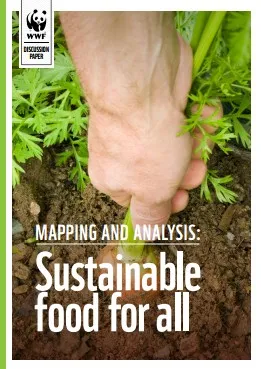
This report from the Swedish WWF's Ecological footprint unit provides a mapping of current scenarios, ongoing work and a compilation of knowledge on sustainable production and consumption of food.
The structure of the report is described as follows:
“The report starts out with a mapping of scenarios for the future relating to food from global stakeholders. After this, analysis tools are explored. This section discusses quantitative and qualitative tools, and lists some of the currently developing tools for sustainability assessment of the food chain. The next section explores instruments for change including policy, market and consumer initiatives. Finally, a series of issues are explored and suggestions for actions are given for different stakeholders.”
Some of the conclusions of the report concern positive and negative global trends for reduced food footprint in 2050.
Signs pointing in a positive direction:
- Increasing awareness on a policy level of the urgency to steer development in a more sustainable direction.
- Funding for research increasingly directed towards development of sustainability - knowledge is being developed.
- Market stakeholders alerted and entering sustainability work: corporate social responsibility, market transformation initiatives and similar.
But there are also signs pointing in the wrong direction:
- Policy to pinpoint the contribution of the food sector to sustainability is weak and uncoordinated.
- Consumption trends point towards increased impact of food on the ecological footprint. Increased wealth drives increased consumption of meat and resource intensive commodities. Some consumers may be aware of the importance of food in relation to sustainability, but this awareness is rarely translated into action with impact. Overshoot day, the date when humanity has exhausted natures budget for that year comes earlier and earlier. Changes needed for a sustainable food future will be perceived by many as uncomfortable and infringing on their habits. The incentive for change is small when actions give consequences that are not obvious here and now. The systems are abstract and complicated, making it difficult to design efforts that are understandable and mutually agreed upon.
The full report can be found here and for an executive summary/short version, see here.
Read more about sustainable diets and carbon footprint of food here and here




Comments (0)